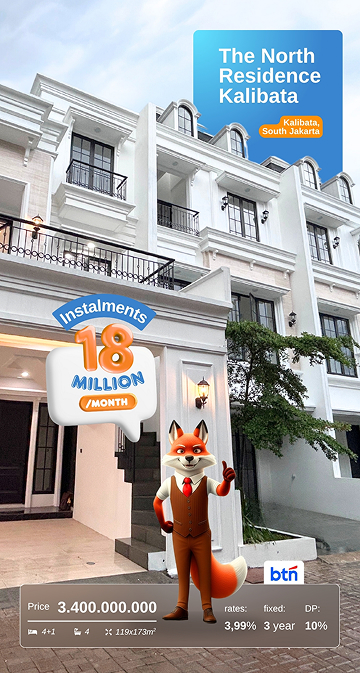Buying a home is a dream. The process isn't easy, requiring time, effort, and, of course, a significant amount of money. Home Ownership Loans (KPR) offer a solution to make this dream a reality.
However, it's not uncommon to be surprised by a sudden spike in mortgage payments midway through. If this happens to you, don't panic! You may have chosen the wrong interest rate from the start.
Here, we'll discuss why mortgage payments can skyrocket, the difference between fixed and floating interest rates, and provide a practical guide to finding the best solution if you've already made a mistake. Let's learn more!
Why Can Mortgage Interest Rates Soar Drastically?
Often, houses with mortgages have problems with inflated instalments rooted in one thing: suku bunga mengambang (floating rate). At the beginning of your loan, your mortgage payments may feel low because you'll enjoy a low promotional interest rate. This rate is typically offered by banks to attract customers. However, once the promotional period (e.g., a 1-3 year term) ends, your mortgage interest rate will change to a floating rate.
This floating interest rate is not static. The calculation is based on Bank Indonesia (BI) benchmark interest rate, which is often known as BI-7 Day Reverse Repo Rate (BI7DRR), plus the profit margin set by the bank. This means that if the BI benchmark interest rate rises, your mortgage interest rate will automatically rise as well. And the impact will be directly felt in your monthly instalments.
Otherwise, suku bunga tetap (fixed rate) is an interest rate that remains unchanged for a pre-agreed period (e.g., 5-10 years). This ensures stable instalments, regardless of fluctuations in the benchmark interest rate.
So, if you choose a mortgage with a floating interest rate, you're actually taking a risk. The risk that after purchasing a future home, your instalments could increase sharply and erode your financial budget.
Fixed Rate vs. Floating Rate: Which Mortgage Rate is Better?
These differences between the two types of interest rates are crucial before you decide to apply for a mortgage. Here's a detailed comparison:
| Aspect | Suku Bunga Tetap (Fixed Rate) | Suku Bunga Mengambang (Floating Rate) |
| Definition | An interest rate whose value remains fixed for a certain period. | Interest rates whose value can change at any time. |
| Instalment Stability | Very Stable. Instalments will not change during the fixed period. | Not Stable. Instalments can increase or decrease in line with changes in the benchmark interest rate. |
| Valid Period | Usually valid for the first 1-10 years. | Applicable after the fixed interest rate period or from the start of the mortgage. |
| Risk | Low. You avoid the risk of rising interest rates. | HighYou face the risk of your instalments soaring if the benchmark interest rate rises. |
| When is it Appropriate? | When interest rates are low or you want long-term financial security. | When interest rates are high and is predicted to go down, or you want to take the risk for a lighter initial instalment. |
While fixed-rate mortgages are often higher than floating-rate mortgages, the stability they offer is far more valuable. This allows you to carefully plan your home purchase and avoid unpleasant surprises.
Here's the Solution! When Mortgage Interest Rates Soar
If you're already stuck with skyrocketing mortgage interest rates, don't despair! There are several solutions you can consider to ease your financial burden:
1. Negotiate with your bank
The first step you should take is to speak with your bank. Ask if there are any loan restructuring schemes available. You can ask the bank to:
Extending the loan tenor: This will make your monthly instalments lighter, although the total interest you have to pay will be greater.
Changing the interest rate scheme: Some banks may offer the option to convert your floating interest rate to a fixed interest rate, even at the current prevailing interest rate.
2. Apply for a mortgage takeover
A mortgage takeover is the most common solution when mortgage instalments feel too burdensome. Applying for a takeover involves transferring your remaining mortgage debt from your old bank to your new one.
How does it work?
The new bank will pay off your remaining debt at the old bank. Afterwards, you'll enter into a new mortgage agreement with that bank, with more favourable terms and conditions, including:
Lower interest rates
Conduct a survey of several banks to find banks that offer lower mortgage takeover interest rates, whether fixed rates or more competitive floating rates.
Longer loan tenor
You can apply for a longer loan term to get lighter monthly instalments.
Terms and Procedures for Mortgage Takeover
- Make sure you have a history of regular instalment payments at your old bank. Your new bank will check this.
- Prepare the required documents, such as KTP, NPWP, pay slip, bank statement, and property ownership documents.
- There are costs that you must prepare for, such as provision fees, administration fees, notary fees, and property appraisals.
Even though there are initial costs, taking over a mortgage can be a very profitable investment in the long term because it can save you millions to tens of millions of rupiah in total interest that you have to pay.
3. Top Up Your Mortgage
If you need additional funds and your mortgage payments are overwhelming, you might consider a mortgage top-up. This is a scheme where you apply for an additional loan using the same collateral (your home).
How does it work?
The bank will reassess your property's value (appraisal). If your property's value increases, you can apply for an additional loan. You can use the funds from this top-up for various purposes, including paying off part of your remaining mortgage principal, thus lowering your monthly instalments.
4. Make Partial or Full Payment
If you have fresh funds, whether from a bonus, investment income, or other sources, you might consider paying off some or all of your mortgage debt. This is the quickest way to reduce your mortgage payments or even eliminate them completely.
What to Remember
Ask your bank if there's a fixed penalty fee for early repayment. These fees typically range from 1-3% of the remaining principal.
If you're still on a fixed rate, consider this carefully. Prepayment during this period may incur higher penalties.
5 Tips for Choosing a Mortgage
To avoid getting caught in the problem of skyrocketing instalments later on, follow these smart guidelines when applying for a mortgage:
- Calculate Your Financial Capacity: Don't just focus on a low initial payment. Calculate your ability to repay if interest rates rise in the future. Use an online mortgage calculator to simulate this.
- Understand the Difference in Interest Rates: Always ask and understand in detail the differences between fixed interest rates and floating interest rates offered by banks.
- Pilih Periode Fixed Rate yang Lebih Lama: If possible, choose a mortgage with a longer fixed rate (e.g., 5-10 years). This will give you certainty and enough time to prepare for a floating interest rate.
- Read the Contract Carefully: Never sign a mortgage contract without reading it carefully. Make sure you understand all the terms and conditions, including interest rate calculations, penalties, and other fees.
- Conduct a Bank Survey: Don't rush. Compare mortgage offers from several banks. Pay attention to interest rates, fees, and the bank's reputation.
Mortgage Take Over with Lets Move Group Lets Move Group
If you've already made a mistake, a mortgage takeover is the most effective solution for getting lighter and more affordable instalments. Remember, a home is a long-term investment, and thorough financial planning is key to realising that dream without a burden. Take action now and ensure your financial future remains secure with Lets Move Group. Get a free consultation and contact us now!














